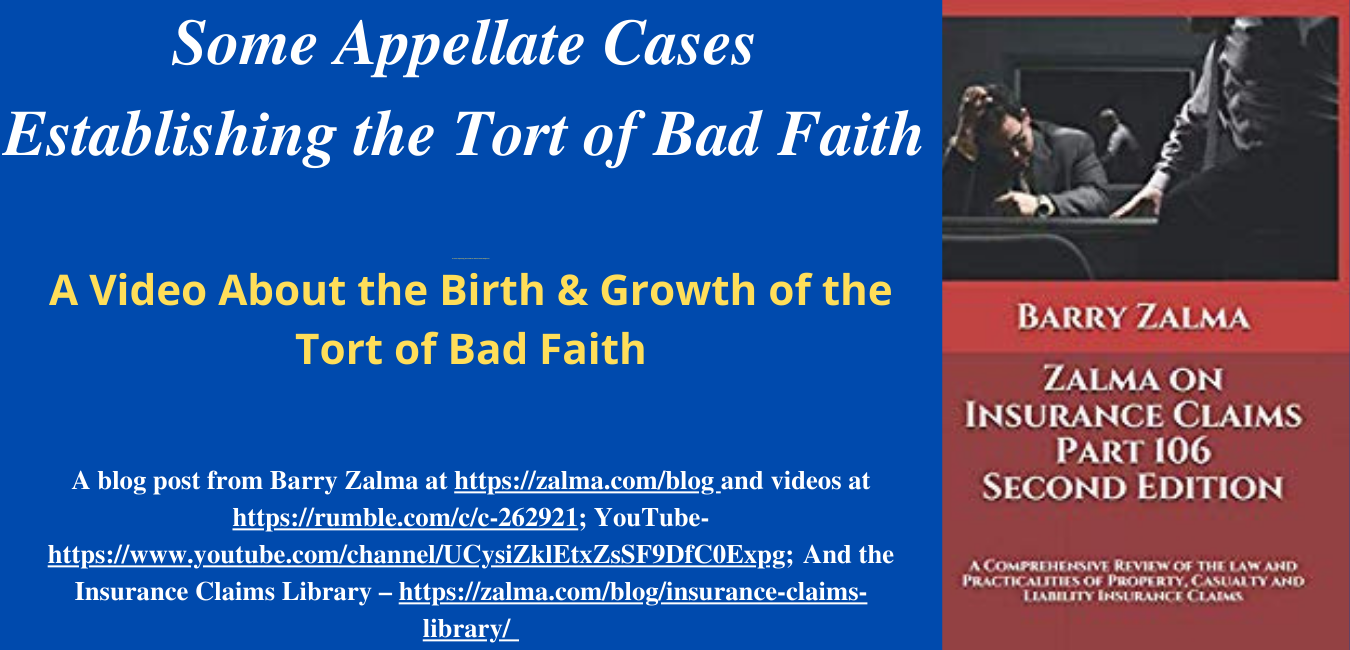-
News Feed
- EXPLORE
-
Pages
-
Groups
-
Events
-
Blogs
-
Marketplace
-
Offers
-
Jobs
-
Developers
Some Appellate Cases Establishing the Tort of Bad Faith

A Video About the Birth & Growth of the Tort of Bad Faith
Read the full article at https://www.linkedin.com/pulse/some-appellate-cases-establishing-tort-bad-faith-zalma-esq-cfe and see the full video at https://rumble.com/zalma and at https://youtu.be/RMk_et9UDZ4 and at https://zalma.com/blog plus more than 3900 posts.
Fletcher v. Western Life
In Fletcher v. Western Life Ins. Co., 10 Cal. App. 3d 376, 89 Cal. Rptr. 78 (1970), the plaintiff, Fletcher was, at the time of trial, a 41-year-old father of 8 children, seven of whom were still in school.
Gruenberg v. Aetna
It is manifest that a common legal principal underlies all of the foregoing decisions; namely, that in every insurance contract there is an implied covenant of good faith and fair dealing. The duty to so act is imminent in the contract whether the company is attending to the claims of third persons against the insured or the claims of the insured itself. Accordingly, when the insurer unreasonably and in bad faith withholds payment of the claim of its insured, it is subject to liability in tort.
Silberg v. California Life
ZALMA OPINION
An insurer should never leave the insured without benefits while it is involved in a dispute with another insurer or provider of benefits. It should, rather, protect its right to dispute coverage and get its money back by means of a reservation of rights letter or a non-waiver agreement. The reservation of rights letter keeps the insurer, while it is taking care of an insured whose coverage is in question, from being bound to the insured forever. It allows the insurer, unilaterally, to give itself the opportunity to complete a thorough investigation, determine whether coverage applies, and then—if it does not apply—withdraw its benefits and even seek return of what it has paid. The non-waiver agreement is a contract where both the insured and the insurer agree that while the insurer is investigating neither party waives the rights available under the contract.
We are 100% funded for October.
Thanks to everyone who helped out. 🥰
Xephula monthly operating expenses for 2024 - Server: $143/month - Backup Software: $6/month - Object Storage: $6/month - SMTP Service: $10/month - Stripe Processing Fees: ~$10/month - Total: $175/month
- Art
- Causes
- Crafts
- Crime
- Dance
- Drinks
- Film
- Finance
- Fitness
- Food
- Games
- Gardening
- Health
- Home
- Literature
- Music
- Networking
- Paranormal
- Other
- Politics
- History
- News
- Party
- Science
- Religion
- Shopping
- Sports
- SyFy
- Politically Incorrect
- Philosophy
- Theater
- Technology
- Wellness



